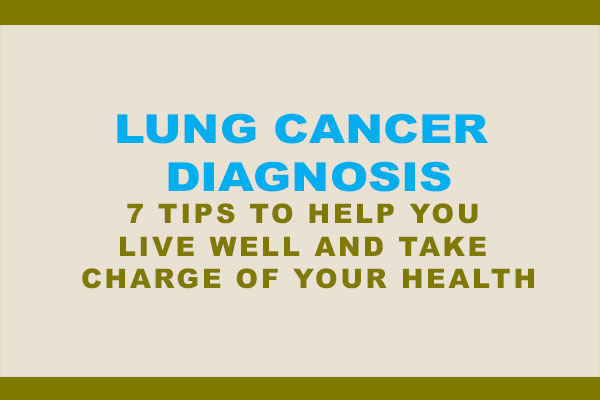Dealing with a Diagnosis of Lung Cancer
7 Tips to Help You Live Well and Take Charge of Your Health
There isn’t one best or easiest way to live with a diagnosis of lung cancer. Here are some suggestions for ways you can live well and take positive steps to deal with your diagnosis and treatment.
1. Advocate for yourself.
Talk with your doctors and nurses. Ask questions. Ask them to repeat things you don’t understand. Repeat back to them what you think you heard and ask them to confirm that you understand. Be active in your care and choices. Use a notebook to keep track of questions you have and information about your health and disease, such as your latest test results, medical reports, and notes. Bring a family member or friend with you to all appointments so you can confirm the information you hear from your doctors.
2. Don’t let anyone steal your hope.
Even the experts don’t understand everything about lung cancer, especially how each person will respond to treatment. Be cautious when reading the statistics; they do not tell you about your specific lung cancer. Find doctors who share your hope for survival and are willing to fight alongside you.
Unless your doctor has told you otherwise, keep your daily routine and remain active as much as you can.
3. Let family and friends help.
When your cancer was diagnosed, your family and other loved ones likely began their own personal journeys with lung cancer. They are dealing with their own sadness, fears, and worries. One way for them to handle their feelings is to try to take care of you. If possible, allow them to help you. It is part of their healing process as well as yours.
4. Get support from your peers.
Reach out to others for support. There are a lot of in-person and online support resources that you may find helpful. If you need someone to talk to, call the Lung Cancer Support Line at (844) 835-4325. It is a free service for patients with lung cancer and their caregivers.
How Family & Friends Can Help
When it comes to family and friends, be sure to:
• Surround yourself with positive and encouraging people.
• Take someone along to doctor visits to help listen or take notes.
• Accept offers for help. When people ask, “What can I do?”, it is because they truly want to “do” something. Allow them the pleasure and privilege of helping you. They can cook for you, bring you flowers, play cards, or do whatever you can think of that will help you with your lung cancer journey.
• Continue with the community activities you can, such as book clubs, community groups, etc., to keep your life as “normal” as possible, and let your friends know what you are going through. Sharing information, involving friends in your life, and spreading awareness can help you on your journey with lung cancer.
5. Stay active.
Unless your doctor has told you otherwise, keep your daily routine and remain active as much as you can. Staying active with some exercise can help you have fewer side effects and decrease your risk of infection as well as recovery time post-treatment. People who stay physically active also report that their overall emotional well-being is improved. Ask your doctor what level of activity is best for you.
6. Join a community.
Support groups offer a safe and supportive place to talk with others going through situations similar to yours. However, some people are not comfortable seeking out support groups because they feel guilty about a lung cancer diagnosis. If you have smoked and you feel it is your own “fault” that you have lung cancer, participating in a support group may be an especially important and helpful step in your lung cancer journey. Remember, no one deserves lung cancer, and everyone deserves appropriate treatment and support. Even if there is no support group near you, multiple resources are available online and via telephone.
You may go to your first support group meetings seeking encouragement and hope for yourself, only to find that you have the power to give that same encouragement and hope to someone else. Many kinds of support are available, and some groups can also help your family and loved ones who are affected by your illness. Many people continue to find comfort from support groups even after their treatment has ended.
7. Stay connected with your cancer care team.
Some level of distress is normal with a diagnosis of lung cancer. If you find you are suffering from anxiety or depression, talk to your cancer treatment team. Your symptoms can be relieved with therapy and/or medications.
Reprinted with permission from the Lung Cancer Research Foundation, lungcancerresearchfoundation.org.
This article was published in Coping® with Cancer magazine, September/October 2021.


